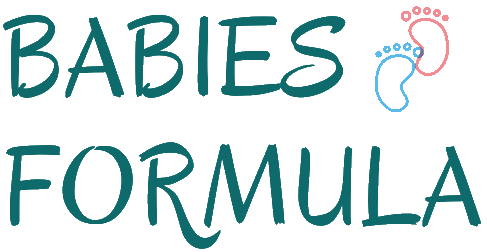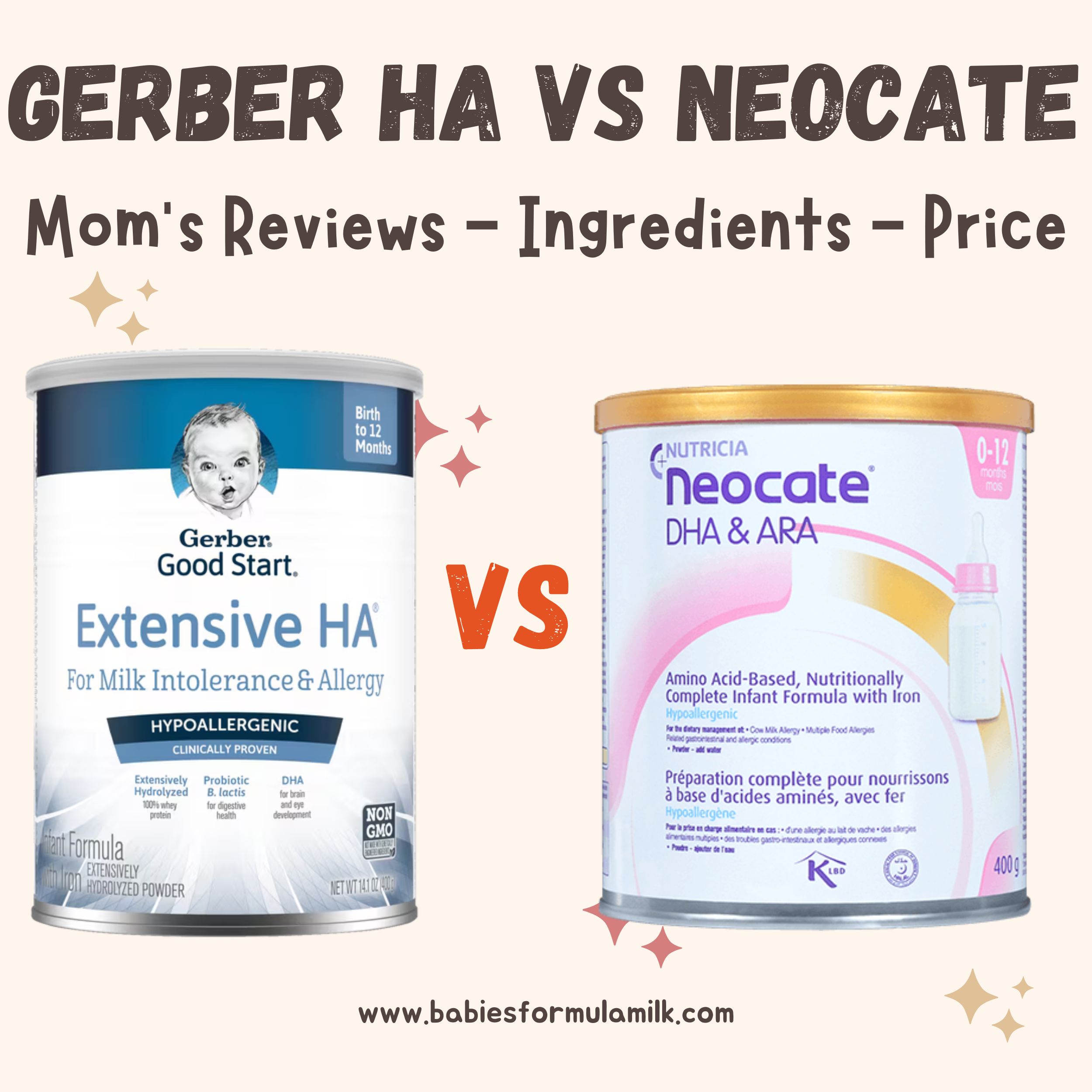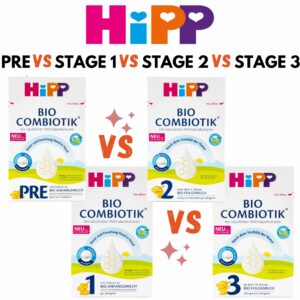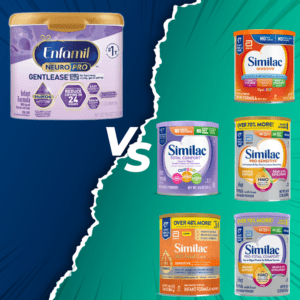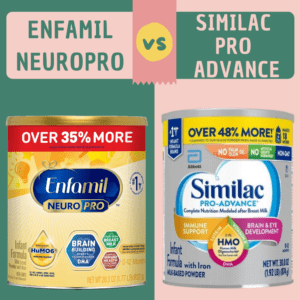What’s The Difference?
The difference between Neocate and Gerber Extensive HA is that Neocate is an amino acid formula designed for infants with severe allergies, intolerances, or complex dietary requirements whereas Gerber Extensive HA is a hypoallergenic formula for babies with milder cow’s milk protein or lactose intolerances.
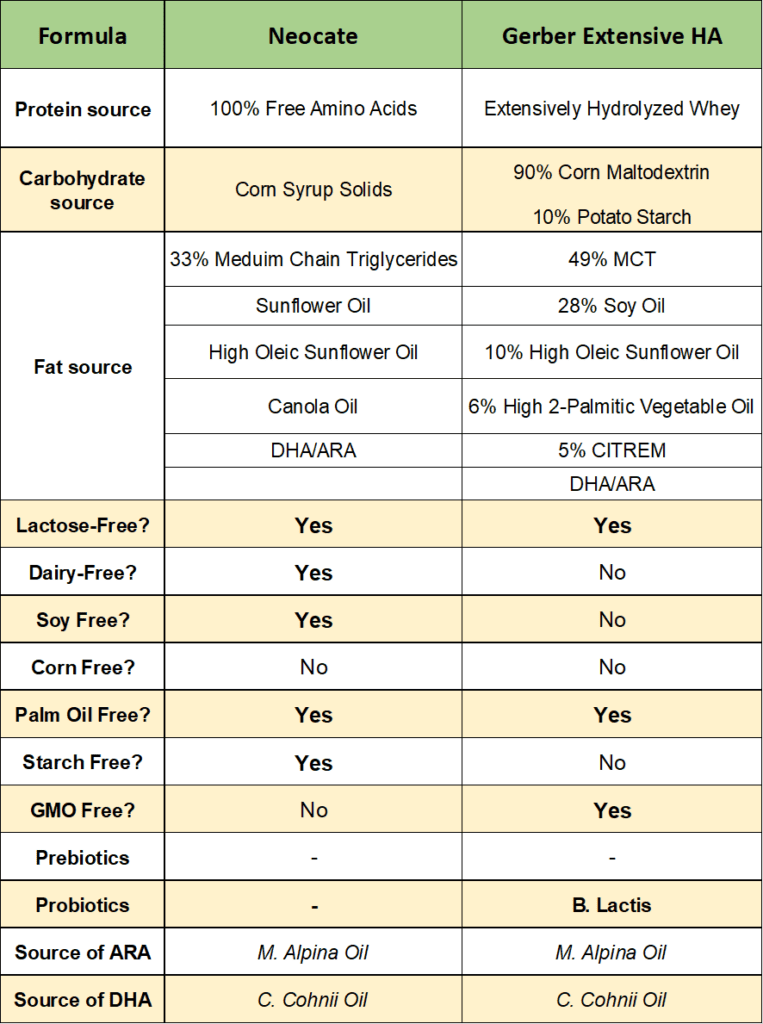
The Best One?
When considering the choice between Gerber Extensive HA and Neocate, it’s important to weigh the specific benefits of each formula against your baby’s individual dietary needs and any potential allergies or sensitivities. Here’s a conclusion based on the provided information:
Gerber Extensive HA is an excellent option for babies with cow’s milk protein and lactose intolerances, as well as casein allergies. It offers the advantages of being GMO-Free, promoting regular bowel movements, relieving gas, and helping with diaper rash. Additionally, it is enriched with vitamins and comes at a more budget-friendly price point.
Neocate, on the other hand, is a specialized formula suitable for infants with more severe dietary issues, such as cow’s milk protein allergy (CMPA), milk/soy protein intolerance (MSPI), and starch allergies. It has demonstrated benefits for babies with reflux, eczema, tummy problems, and blood in stools. Neocate is enriched with essential minerals to support overall health.
“When you buy something using my links, I may earn a small commission at no additional cost to you. This is a kind of support to me. This website doesn’t accept money for reviews. “
Mom’s Reviews Comparison:
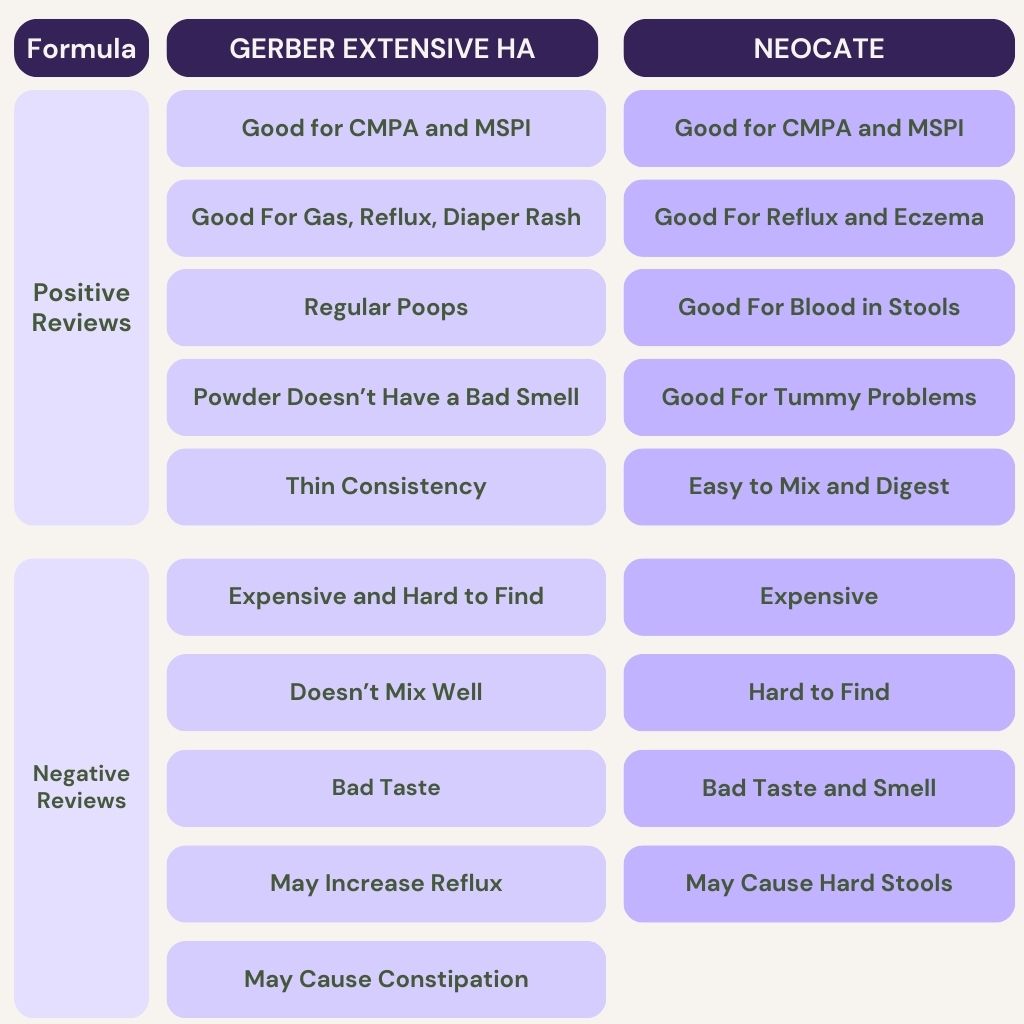
When it comes to choosing the right hypoallergenic infant formula for babies with special dietary needs, mothers’ reviews play a crucial role in helping parents make informed decisions. Gerber Extensive HA and Neocate are two prominent choices in this category, each with its own set of advantages and drawbacks as reported by parents. I have read all Gerber Extensive HA and Neocate reviews on Amazon and found this:
Gerber Extensive HA:
Positive Reviews:
- Effective for CMPA and MSPI: Many mothers have praised Gerber Extensive HA for its effectiveness in managing Cow’s Milk Protein Allergy (CMPA) and Milk/Soy Protein Intolerance (MSPI), providing relief for babies with these conditions.
- Gas and Reflux Relief: This formula has received positive feedback for its ability to reduce gas and alleviate reflux symptoms in infants.
- Diaper Rash Improvement: Some mothers have noted that using Gerber Extensive HA contributed to a reduction in diaper rash occurrences, suggesting potential benefits for sensitive skin.
- Regular Poops: Parents have reported that their babies experienced regular and comfortable bowel movements while on this formula.
- Mild Smell and Thin Consistency: Unlike some other hypoallergenic formulas, Gerber Extensive HA has been commended for having a powder with a relatively mild odor and a thin consistency that won’t gunk up their saliva.
Negative Reviews:
- Costly (but relatively cheaper): While considered less expensive compared to Neocate and other hypoallergenic options, Gerber Extensive HA still comes with a significant price tag, which has been a concern for some parents.
- Availability Issues: Many mothers have noted that it can be challenging to find Gerber Extensive HA in physical stores, requiring them to rely on online sources.
- Taste and Constipation Concerns: Some babies may find the taste unpleasant, and some have experienced constipation while using this formula.
- Reflux and Choking Incidents: Although it’s generally praised for reflux management, but other moms have reported that their babies experienced reflux and occasional choking while on this formula.
- Small Can Size: Gerber Extensive HA is available in small cans, which may not last an entire week, leading to frequent purchases.
You probably notice that I talk about reflux in positive and negative reviews, and that’s because I have found that 14 moms have reported that this formula shows good results in relieving reflux, and 14 moms said that it worsened it.
Related: EleCare VS Gerber Extensive HA: What’s The Difference?
Neocate:
Positive Reviews:
- Reflux and Eczema Management: Neocate has earned praise for its effectiveness in managing reflux and improving eczema symptoms in babies.
- Tummy Troubles and Blood in Stools: Some mothers have reported that Neocate was successful in alleviating gastrointestinal issues, including tummy problems and the presence of blood in stools.
- Ease of Use: Parents have noted that Neocate is easy to mix and digest, simplifying the feeding process for both the baby and caregiver.
Negative Reviews:
- High Cost: The most significant drawback mentioned by mothers is the high price of Neocate, making it less budget-friendly for many families.
- Taste and Smell Concerns: Similar to Gerber Extensive HA, Neocate has received criticism for its taste and smell, which some babies and parents find unpleasant.
- Hard Stools: A few babies using Neocate have experienced issues with harder stools, which can be uncomfortable for the infant.
- Availability Challenges: Neocate is also reported to be challenging to find in physical stores, necessitating online purchases.
Related: Puramino VS Gerber Extensive HA: What’s The Difference?
Ingredients Comparison:
Protein Source:
Gerber Extensive HA: Extensively Hydrolyzed Whey Protein
The source of protein in Gerber Extensive HA is whey, which is a component of cow’s milk. However, the extensive hydrolysis process breaks the protein down to a level where it is less likely to cause allergic reactions in babies with cow’s milk protein allergies (CMPA) or milk/soy protein intolerance (MSPI).
Related: Nutramigen Vs Gerber Extensive HA: Which One is The Best?
Neocate: Free Amino Acids
Neocate takes a different approach by using free amino acids as its protein source. Free amino acids are the individual building blocks of protein, and they are in their simplest form, requiring minimal digestion. Neocate does not contain intact proteins or protein fragments; instead, it provides amino acids directly, bypassing the need for the digestion of proteins.
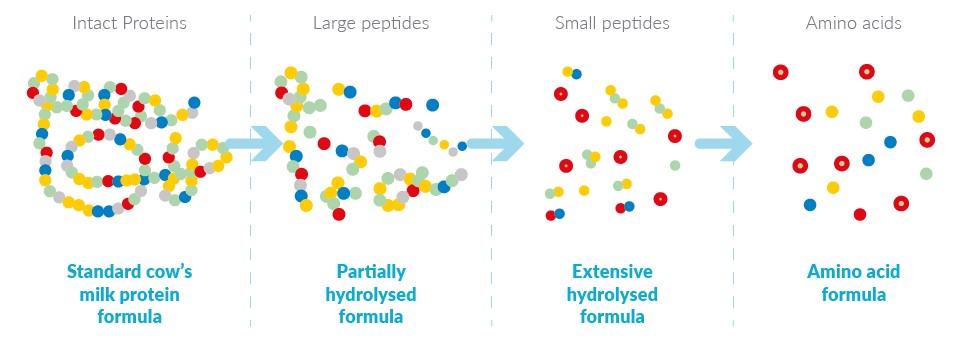
Carbohydrate Source:
Gerber Extensive HA: 90% Corn Maltodextrin and 10% Potato Starch
- Carbohydrate Composition: Gerber Extensive HA primarily relies on a blend of carbohydrates, with 90% of its carbohydrate content coming from corn maltodextrin and the remaining 10% from potato starch. Corn maltodextrin is a complex carbohydrate that is easily digestible and often used as an energy source in infant formulas. Potato starch, while less common in infant formulas, is also a source of carbohydrates and is generally well-tolerated.
Neocate: Corn Syrup Solids
- Carbohydrate Composition: Neocate utilizes corn syrup solids as its primary carbohydrate source. Corn syrup solids are a source of simple carbohydrates, which can be rapidly absorbed and provide quick energy. In Neocate, these carbohydrates serve as an energy source for infants.
In summary, the carbohydrate sources in Gerber Extensive HA and Neocate differ in composition and nature. Gerber Extensive HA combines corn maltodextrin and potato starch, offering a blend of complex and easily digestible carbohydrates. Neocate, on the other hand, relies on corn syrup solids, which provide simple carbohydrates for rapid energy release.
Related: Alimentum Vs Gerber Extensive HA: Which Formula is The Best?
Fat Source:
Gerber Extensive HA:
- Fat Composition: Gerber Extensive HA contains a diverse mix of fat sources, with 46% of its fat content coming from Medium Chain Triglycerides (MCT), 28% from soy oil, 10% from high oleic sunflower oil, 6% from high 2-palmitic vegetable oil, and 5% from CITREM (Citric Acid Ester of Mono- and Diglycerides).
- Medium Chain Triglycerides (MCT): MCTs are a type of fatty acid that is more easily absorbed and digested by some infants. They are known for their quick energy release and can be beneficial for babies with certain digestive sensitivities.
Neocate:
- Fat Composition: Neocate, on the other hand, primarily relies on medium-chain triglycerides (MCTs), which make up 33% of its fat content. Additionally, it likely includes a combination of other oils such as sunflower oil, high oleic sunflower oil, and canola oil to provide a balanced fat profile.
Prebiotics/Probiotics:
In the realm of infant formulas, the inclusion of prebiotics and probiotics can impact a baby’s gut health and digestion. Gerber Extensive HA and Neocate take different approaches in this regard.
Gerber Extensive HA incorporates the probiotic Bifidobacterium lactis (B. lactis), which are live microorganisms that have the potential to support digestive health by promoting the growth of beneficial gut bacteria. However, it does not contain a prebiotic, which serves as nourishment for these beneficial bacteria.
On the other hand, Neocate does not include either prebiotics or probiotics in its formulation.
Related: EleCare Vs Neocate: Full Comparison (With Charts)
Nutrients Comparison:
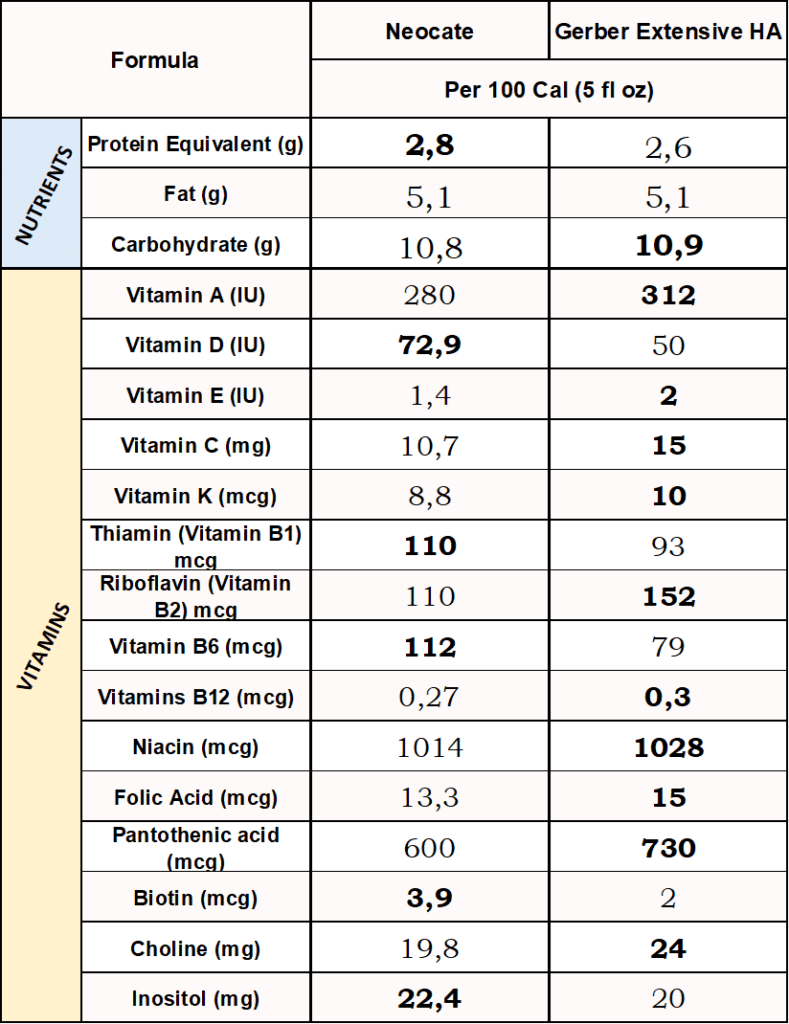
Micronutrients:
While Gerber Extensive HA and Neocate share similar fat levels in their formulations, they diverge in the proportions of carbohydrates and proteins.
Gerber Extensive HA leans more towards carbohydrates, potentially resulting in a different distribution of micronutrients per serving. Neocate, conversely, boasts a higher protein content, influencing its own micronutrient profile.
Related: Alfamino VS Gerber Extensive HA: What’s The Difference?
Vitamins:
Gerber Extensive HA and Neocate each offer distinct vitamin profiles, catering to specific nutritional needs:
Gerber Extensive HA:
- Higher Vitamins: Gerber Extensive HA provides more Vitamin A, Vitamin E, Vitamin C, Vitamin K, Vitamin B2 (Riboflavin), Vitamin B12, Niacin, Folic acid, Pantothenic acid, and Choline, which are essential for various aspects of infant growth and development.
Neocate:
- Higher Vitamins: Neocate contains higher levels of Vitamin D, Vitamin B1 (Thiamin), Vitamin B6 (Pyridoxine), Biotin, and Inositol. These vitamins contribute to vital functions such as bone health, energy metabolism, and overall well-being.
We conclude that Gerber Extensive HA is enriched with vitamins than Neocate and that explains why babies on Gerber hypoallergenic formula gain weight fast.
Related: Neocate Vs Nutramigen: Mom’s Reviews, Ingredients, and Prices
Minerals:
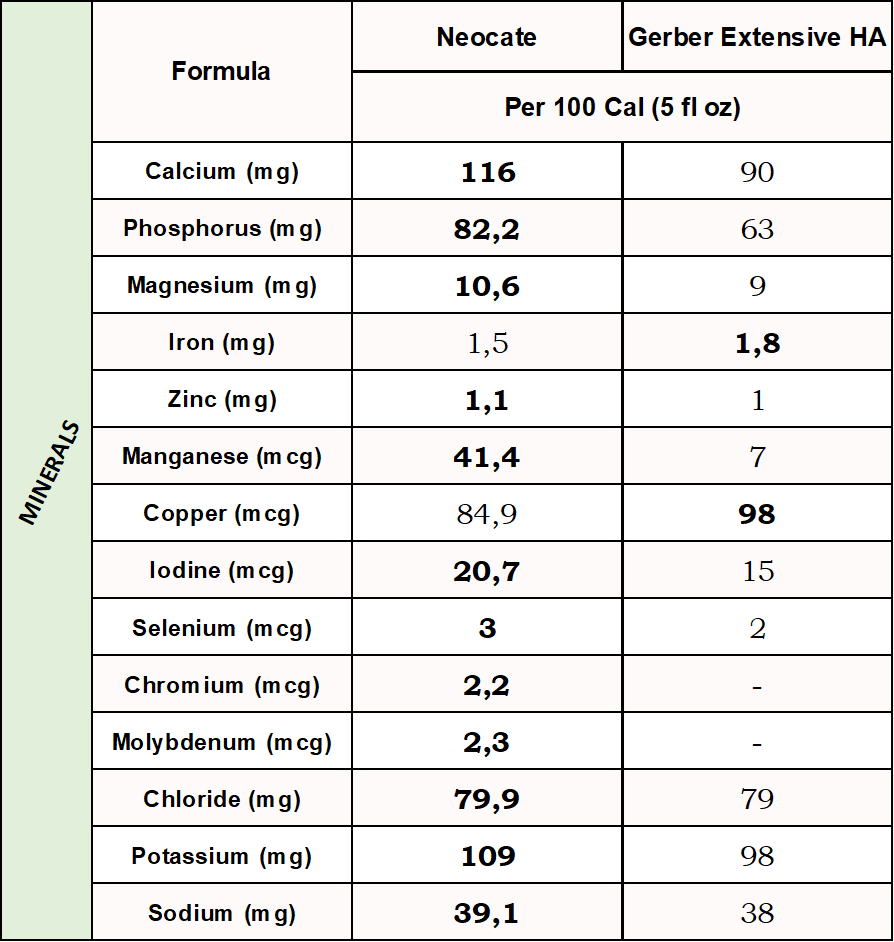
Gerber Extensive HA:
- Higher Iron and Copper: Gerber Extensive HA provides elevated levels of Iron and Copper, essential minerals for healthy blood development and overall growth.
Neocate:
- Higher Calcium, Phosphorus, Magnesium, Zinc, Manganese, Iodine, Selenium, Chloride, Potassium, and Sodium: Neocate boasts increased amounts of these minerals, which are pivotal for bone health, electrolyte balance, and various bodily functions.
- Additional Minerals: Neocate also includes Molybdenum and Chromium, trace minerals that play roles in enzyme activity and metabolism, respectively.
We conclude that Neocate has an enriched mineral profile than Gerber Extensive HA.
Price Comparison:
| Neocate | Gerber Extensive HA |
|---|---|
| 14.1 oz 46 $ 3.26 /oz Buy HERE | 14.1 oz 26.47 $ 1.88 /oz Buy HERE |
| No Liquid | No Liquid |
| 4.6 of 5.0 767 Rating (Amazon) | 4.1 of 5.0 134 Rating (Walmart) |
When it comes to the cost of infant formula, it’s an important factor for many parents to consider. In this comparison:
- Gerber Extensive HA: Priced at $1.88 per ounce, Gerber Extensive HA is the more budget-friendly option among the two. A 14.1-ounce container would cost approximately $26.50.
- Neocate: Neocate is priced higher at $3.26 per ounce, making it a more expensive choice. A 14.1-ounce container of Neocate would cost approximately $45.99.
Neocate is more expensive than Gerber Extensive HA primarily due to its specialized nature and the unique ingredients required to make it an amino acid formula. The rigorous quality control, research and development, and lower production volumes also contribute to its higher cost.
Neocate is designed for infants with severe allergies or dietary needs, making it a critical and specialized option that comes with a higher price tag compared to more general infant formulas.
How to Switch From Gerber Extensive HA to Neocate:
Switching from Gerber Extensive HA to Neocate should be done gradually and under the guidance of a healthcare professional, preferably a pediatrician or a pediatric gastroenterologist, especially if you are making the switch due to specific medical needs or concerns. Here’s a general guideline for transitioning between these two infant formulas:
- Consult with a Healthcare Professional: Before making any changes to your baby’s formula, consult with your baby’s healthcare provider. They will assess your baby’s specific dietary needs and provide guidance on the transition.
- Gradual Transition: It’s essential to transition slowly to minimize digestive discomfort and ensure that your baby tolerates the new formula well. Here’s a step-by-step approach:
- Day 1-2: Start by mixing 25% Neocate with 75% Gerber Extensive HA in a single feeding. Observe your baby for any adverse reactions.
- Day 3-4: Increase the Neocate concentration to 50% while decreasing the Gerber Extensive HA to 50%.
- Day 5-6: Further increase the Neocate concentration to 75% and reduce the Gerber Extensive HA to 25%.
- Day 7 and beyond: If your baby tolerates the transition well, you can switch entirely to Neocate.
- Observe Your Baby: Pay close attention to your baby’s reactions during the transition. Look for any signs of digestive upset, allergic reactions, or changes in behavior. If you notice any concerning symptoms, consult with your healthcare provider immediately.
- Adjust Feeding Schedule: Keep your baby on their regular feeding schedule throughout the transition. Monitor their intake to ensure they are getting adequate nutrition.
- Monitor Health: Continue to monitor your baby’s health and growth throughout the transition and afterward. Schedule follow-up appointments with your healthcare provider as recommended to assess your baby’s progress.
- Hydration: Ensure that your baby is well-hydrated during the transition. You can continue to offer breast milk or prepared infant formula as directed by your healthcare provider.
- Stay Informed: Familiarize yourself with the specific instructions and preparation guidelines for Neocate, as it may have different mixing instructions than Gerber Extensive HA.
Conclusion:
In conclusion, if your baby has mild to moderate dietary concerns, Gerber Extensive HA offers a well-rounded and cost-effective option. However, if your baby has severe allergies or complex dietary needs, Neocate’s specialized formula may be the more suitable choice. Always consult with a healthcare professional to determine the best formula for your baby’s specific situation, as their expertise can guide you toward the most appropriate option.
